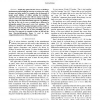Free Online Productivity Tools
i2Speak
i2Symbol
i2OCR
iTex2Img
iWeb2Print
iWeb2Shot
i2Type
iPdf2Split
iPdf2Merge
i2Bopomofo
i2Arabic
i2Style
i2Image
i2PDF
iLatex2Rtf
Sci2ools
103
click to vote
CIG
2006
IEEE
2006
IEEE
Fun in Slots
— People play games for fun. Yet we are lacking a fundamental understanding of what fun is and how fun works in games and other media. For example, why do thousands of people spend millions of dollars playing slot machines, especially when most know they will lose money in the long run? To answer this question, I present an aesthetic analysis of slot play using a Bayesian-information approach. The finding is that fun in slots can be seen as arising from a difference in information gained from good versus bad outcomes. This difference is modeled by marginal entropies and the result is a measure of fun in slot play, showing for what range of payoff probabilities slots are fun and at what probability they are most fun. The approach is extended to games of skill and the same Bayesian-information theory is used to derive computational measures of fun in these games.
| Added | 10 Jun 2010 |
| Updated | 10 Jun 2010 |
| Type | Conference |
| Year | 2006 |
| Where | CIG |
| Authors | Kevin Burns |
Comments (0)

